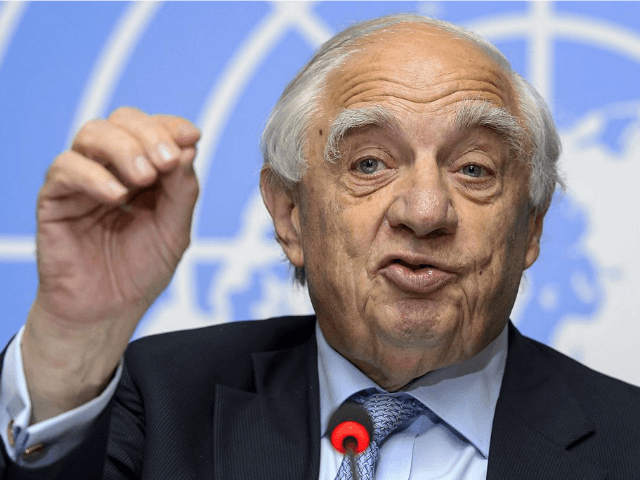United Nations (UN) representative and former Goldman Sachs banker Peter Sutherland has declared that European countries must open their borders to all, including economic migrants. Mr. Sutherland said that refusal to accept everyone who wants to live in Europe is an affront to the European values of dignity and equality of man. Economic migrants, he claimed, are “survival fighters” and the future of Europe.
Speaking on a panel about immigration in Berlin, Mr. Sutherland, the UN’s Special Representative of the Secretary-General for International Migration, also argued that European leaders must tackle populism, which he said runs counter to European Union (EU) values. The UN migration chief said the EU must find a solution to the “problem” of “xenophobic populism”, calling opposition to open borders counter to “the values of the EU – the dignity of man and the equality of man”.
Mr. Sutherland contended that the EU should not be blamed for not opening the floodgates of migration, as it is down to “the absolute failure of member states, its governments”. Mr. Sutherland, who was the youngest person ever appointed to the European Commission, slammed governments in the EU who he said are “playing up the nationalist card, feeding the populism of those who do not believe in the fundamental values that we have”.
He argued that European leaders should stop “pussyfooting” around migration, and that “it’s necessary now” to engage with EU values which he said includes open borders for economic migrants.
Mr. Sutherland said: “We’re not just talking, either, about refugees. We’re talking about economic migrants, many of whom could be the future, and some at the present… are survival fighters. They’re not to be dismissed as an irrelevance.”
Concluding his main contribution to the panel, Mr Sutherland said business is “partial to” Europe having an open borders policy, but expressed his belief that they are not being proactive enough in the debate.
Mr. Sutherland also lamented the fact that his critics often bring up his position as Goldman Sachs chairman for twenty years, from which he only stepped down in 2015. Because of his banking role he said critics “diminish me for bringing us together and giving us the opportunity of making and discussing the arguments as to how [migration] can best be had.”
Responding to a question from a journalist, Mr. Sutherland said it is the media’s responsibility to counter populism by “report the facts [about migration] in a positive way”.
“The press [is] the biggest failure in my opinion, in this debate. Because far from abating the populism, which is creating xenophobia, many organisations are doing the opposite,” the UN representative argued.
It is unclear why Mr. Sutherland believes mass migration of unskilled migrants from poor countries would benefit European economies when the facts suggest they are a serious drain on EU states’ resources. Non-EU migrants cost the UK treasury £17 billion a year, net, while across the continent they have more than double the unemployment rates of Europeans.
This is borne out by a variety of datasets from different European countries. For example, 65 per cent of non-European migrants who arrived in the Netherlands during the 1990s are still living on welfare. A report by the Institute of Public Policy Research noted that the employment rate of people with Somali backgrounds in the UK has rarely been above 20 per cent.
In addition to this, Mr. Sutherland’s warning that offsetting ageing populations with migrants is essential for Europe is not borne out by reality. In December, the Bank of England forecast that in the coming years, half of jobs in Britain will be lost to robots, as a result of automation.
The population of Japan is in the process of ageing, and shrinking, dramatically but the nation has rejected repeated calls for mass migration to “offset” this from international bodies like the International Monetary Fund (IMF). The IMF noted that foreign labour makes up just 0.3 per cent of Japan’s labour force. As of April this year, the country’s unemployment rate was just 3.2 per cent, and the Japanese enjoy some of the highest living standards in the world.
In 2012 Mr. Sutherland, stated that the European countries must become multicultural, “however difficult it may be to explain this to the citizens of those states”. Calling migration a “crucial dynamic for economic growth”, he said the EU should undermine the homogeneity of its member states. Ireland’s former Attorney General pointed to North America, Australia, and New Zealand, countries where people of European descent will soon be a minority, as successful examples of this.
The Founding Director-General of the World Trade Organisation told the House of Lords EU home affairs sub-committee which was investigating global migration that “at the most basic level individuals should have freedom of choice” about where to live. He also said that EU states should stop targeting “highly skilled” migrants and end restrictions on low-skilled migrants.

COMMENTS
Please let us know if you're having issues with commenting.